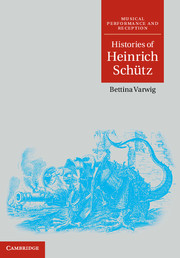Book contents
- Frontmatter
- Contents
- Abbreviations
- Music examples
- Figures
- Acknowledgments
- Introduction
- Chapter One Trumpets and drums (Psalmen Davids, 1617)
- Chapter Two Echoes, mirrors and masks (Dafne, 1627)
- Chapter Three Life, death and afterlife (Musicalische Exequien, 1636)
- Chapter Four Old and new worlds (Geistliche Chor-Music, 1648)
- Conclusion
- Chronology
- Bibliography
- Index
Chapter One - Trumpets and drums (Psalmen Davids, 1617)
Published online by Cambridge University Press: 05 November 2011
- Frontmatter
- Contents
- Abbreviations
- Music examples
- Figures
- Acknowledgments
- Introduction
- Chapter One Trumpets and drums (Psalmen Davids, 1617)
- Chapter Two Echoes, mirrors and masks (Dafne, 1627)
- Chapter Three Life, death and afterlife (Musicalische Exequien, 1636)
- Chapter Four Old and new worlds (Geistliche Chor-Music, 1648)
- Conclusion
- Chronology
- Bibliography
- Index
Summary
In the early months of 1617, Heinrich Schütz settled permanently into his post as music director at the Saxon court in Dresden, where he had been on loan from his former employer, Landgrave Moritz of Hesse, intermittently since 1614. After protracted wrangling between the Landgrave and the Elector of Saxony, Johann Georg I, Moritz eventually had to back down, and Schütz ended up attached to the Dresden court for over fifty years until his death in 1672. Shortly after this transfer, Schütz faced a considerable musical and organisational task: at the end of October 1617, Saxony staged extensive celebrations to mark the centenary of the Reformation. Instigated by the Calvinist Elector of Palatine and the theological faculty at the University of Wittenberg, most Protestant cities and principalities of the Holy Roman Empire participated in this first coordinated scheme to commemorate Martin Luther's legendary posting of his Ninety-Five Theses on 31 October 1517. Looking back in 1716 to the 1617 celebration (and a subsequent Reformation jubilee in 1630), a Dresden court official recalled:
Concerning the extraneous liturgical ceremonies, hymns and the like, I have come to know from older people's reports that it all ended up as a great howl of jubilation, and the churches and schools were filled with it, as the 150th Psalm was played through very loudly with such drumming and timpani-ing, trumpeting, piping, fiddling and tooting that it sounded far and wide. Anyone who heard it heaped ridicule on it.
His noise-filled narrative is probably exaggerated, its mocking tone stemming from the author's agenda to prevent another Reformation festival in 1717. For the Dresden court, we have no record of Psalm 150 being heard during the 1617 centenary at all. Even so, the psalm serves as an apt metaphor for the scale and lavishness of the celebrations. Its text enumerates a comprehensive list of musical instruments: the Lord should be glorified with trumpets and harps, with tambourines, strings and organs, with clashing cymbals. The psalm thus enlists the whole spectrum of musical sounds for the purpose of divine thanksgiving, a spectrum that was fully exploited for the 1617 event. Schütz himself wrote a colourful setting of Psalm 150 (SWV 38) at some point in his early career; richly scored for four vocal or instrumental choirs, it was published in his Psalmen Davids of 1619, which also contained those works that were – most likely – heard during the jubilee.
- Type
- Chapter
- Information
- Histories of Heinrich Schütz , pp. 8 - 57Publisher: Cambridge University PressPrint publication year: 2011



